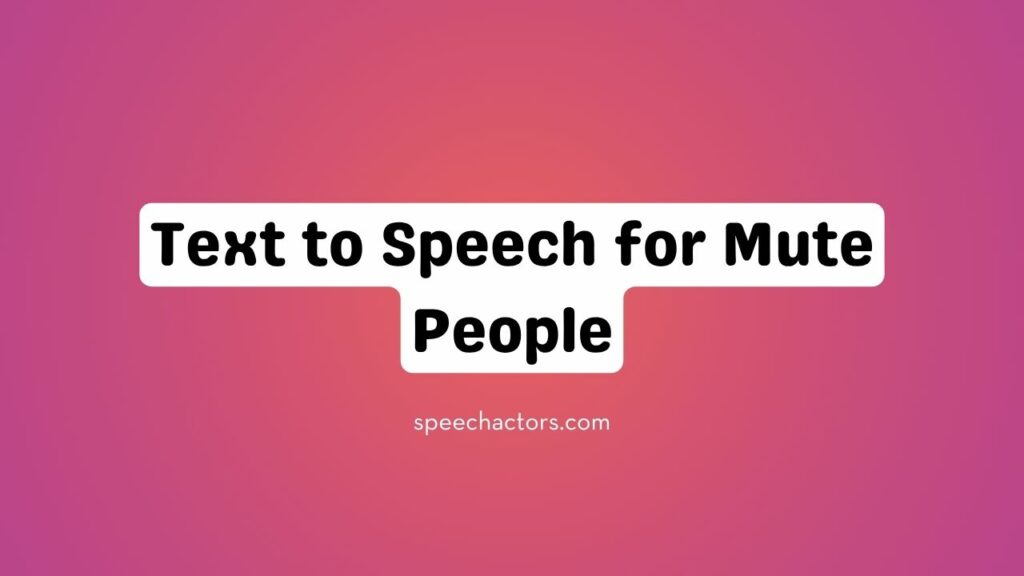Text-to-speech technology has transformed the way of mute people with speech impairments communicate, offering a bridge to the world through their words. For mute individuals, this tool acts as a powerful voice, enabling them to express their thoughts, needs, and emotions with ease.
In recent years, advancements in text-to-speech systems have made these tools more accurate, natural-sounding, and accessible, empowering users to interact more confidently in daily life.
This blog explores how text-to-speech technology is providing vital support for mute individuals, enhancing their communication and improving their quality of life.
How Text to Speech Benefits Mute People?
Text-to-Speech (TTS) technology has transformed lives by enabling verbal communication for mute individuals. It removes barriers in essential areas like education, healthcare, and social interactions, allowing them to express thoughts and ideas effortlessly.
Whether it’s reading lessons in class or participating in a doctor’s consultation, TTS makes it possible to engage fully. Moreover, it empowers independence in both professional and personal settings, giving mute individuals the tools to communicate effectively in meetings, social gatherings, and daily conversations.
With TTS, everyone can have a voice, regardless of physical limitations, ensuring equal opportunities and inclusion in society.
How TTS Technology Works for Mute Individuals?
Text-to-Speech (TTS) technology converts written text into spoken words, making communication easier for mute individuals. It is integrated with assistive devices like computers, tablets, and smartphones.
These devices can read aloud any text, allowing users to communicate without using their voice. TTS can be customized to suit individual needs, offering adjustments for voice tone, speed, and pitch. This helps people express themselves in a way that feels personal and natural.
The technology can even mimic different speech patterns, ensuring that every user can find a comfortable and effective way to communicate. TTS opens up a world of possibilities, making interaction smoother and more accessible.
Real-Life Applications of TTS for Mute People
Text-to-speech (TTS) technology empowers mute individuals to communicate effectively in various daily situations. In public spaces, TTS apps like Speechify and Speak4Me enable users to type messages, which are then spoken aloud, facilitating interactions in restaurants, stores, or public transport.
At work, TTS applications such as Voice Dream Reader and Natural Reader assist in meetings and presentations, allowing users to express ideas seamlessly.
In emergencies, devices like Lightwriter and DynaVox provide quick communication, ensuring safety and clarity . These tools are vital in enhancing the quality of life for mute individuals, promoting independence and social inclusion.
The Role of Speechactors in Supporting Mute People
Speechactors offers customizable voice options, allowing mute individuals to express themselves with clear, natural-sounding speech. The platform’s diverse range of voices makes communication more personal and comfortable for each user.
By integrating Speechactors into communication devices and platforms, users can easily engage in conversations, whether in public, at work, or in emergencies. This seamless integration enhances accessibility, enabling people to interact confidently in various settings.
The realistic, lifelike speech quality makes interactions more engaging, improving social connection and independence for mute individuals. Speechactors truly empowers those who rely on assistive technology for communication.
Overcoming Challenges in Implementing TTS for Mute People
Implementing Text-to-Speech (TTS) for mute individuals comes with several challenges, but overcoming them can greatly enhance accessibility. One key issue is ensuring voice personalization and accuracy.
TTS voices must sound natural and match the user’s intended tone, making communication more comfortable. Another challenge is integrating TTS with assistive devices like hearing aids or mobile apps. These devices must work seamlessly to provide effective communication.
Additionally, it’s crucial to ensure that TTS systems are user-friendly, especially for people with varying levels of tech knowledge. Simplicity in design and functionality helps users feel more confident and independent when using these tools.
Future Trends: Advancements in TTS for Mute People
Advancements in Text-to-Speech (TTS) technology are transforming communication for mute individuals. New AI-driven features, like emotion in speech, are allowing TTS systems to produce more natural and expressive voices.
These systems can now convey feelings, making interactions more personal and human-like. Additionally, multilingual support is becoming a key feature, enabling users to communicate in multiple languages with ease.
As TTS technology evolves, it will continue to play a significant role in promoting inclusivity, ensuring that mute individuals can interact and engage with the world more effectively, breaking down barriers and providing greater independence.
Frequently Asked Questions (FAQs)
How accurate is TTS for people with speech impairments?
TTS technology can be very helpful for people with speech impairments, offering clear and accurate speech synthesis. Studies show it can significantly improve communication, making it more accessible and inclusive.
Can TTS be personalized for individual speech needs?
Yes, TTS can be personalized to meet individual speech needs. With advanced technology, users can customize voice tone, pitch, speed, and language to create a more natural and personalized experience.
What types of devices and platforms support TTS for mute individuals?
Text-to-Speech (TTS) is supported by various devices and platforms like smartphones, tablets, computers, and smart assistants. Popular platforms include iOS, Android, Windows, and macOS, offering accessibility for mute individuals.
How can Speechactors enhance TTS applications for mute people?
Speechactors can enhance TTS applications for mute people by providing natural, expressive voiceovers. It helps individuals communicate effectively, enabling clearer speech and emotional expression through AI-driven voices.
Is TTS suitable for all mute individuals or only certain cases?
Text-to-speech (TTS) technology can benefit many mute individuals, especially those with speech impairments. It helps them communicate effectively, offering a voice for those who cannot speak.
Conclusion
Text-to-Speech (TTS) technology offers a powerful solution for mute individuals, enabling them to communicate effortlessly and effectively. By converting text into speech, TTS bridges the gap, giving a voice to those who otherwise struggle to express themselves.
Explore Speechactors for customized TTS solutions that cater to specific needs, enhancing communication and accessibility.
Let’s embrace TTS technology to improve inclusivity, ensuring that everyone can be heard. Take the step today and empower a more accessible world through TTS.
